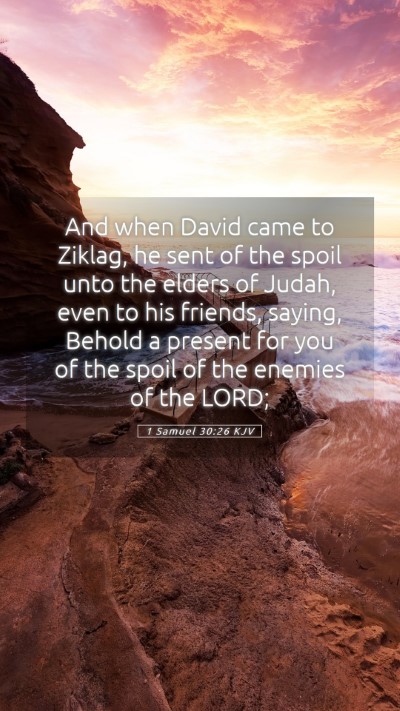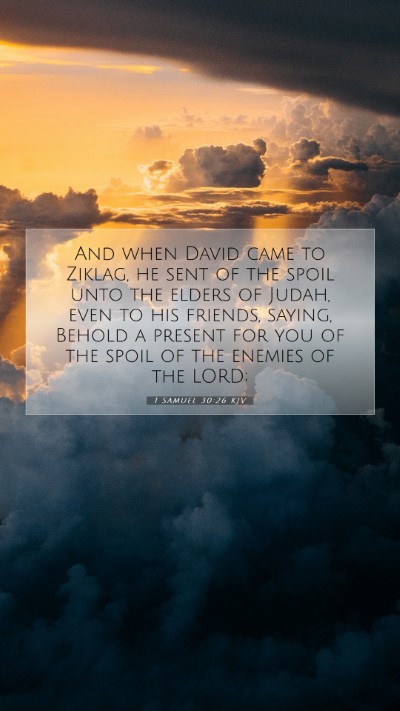Understanding 1 Samuel 30:26
This passage from 1 Samuel 30:26 forms an important moment in the narrative of David's leadership and his experiences as he returns to Ziklag. There is rich significance and learning in this verse, and a combined commentary from various public domain sources gives a fuller understanding of its meaning.
Bible Verse Reference
1 Samuel 30:26 (KJV): "And when David came to Ziklag, he sent of the spoil unto the elders of Judah, even to his friends, saying, Behold, a present for you of the spoil of the enemies of the Lord."
Overview and Context
The backdrop of this verse is critical in understanding its implications. After David and his men faced a great loss and subsequent victory over the Amalekites, David expresses gratitude and generosity by sharing the spoils of his victory with the elders of Judah. This act reflects his leadership qualities and a strong sense of community.
Key Themes
- Generosity: David’s decision to share the spoils signifies the importance of generosity among peers and leaders, emphasizing that true leadership involves serving others.
- Community Support: By reaching out to the elders, David strengthens communal ties and acknowledges the role of the community in God’s plan.
- Recognition of God's Deliverance: The phrase "spoil of the enemies of the Lord" implies that the victory was not only a personal achievement but also an act of divine intervention.
Commentary Insights
Insights from various commentaries help illuminate the deeper meanings of this verse.
Matthew Henry's Commentary
Matthew Henry emphasizes David's recognition of the spoils as a gift from God. He notes the importance of sharing blessings with others, reinforcing the idea that all good things stem from God’s providence. Henry also points out that David's actions exemplify a leader’s responsibility to foster unity among his followers.
Albert Barnes' Notes
According to Barnes, presenting the spoils to the elders highlights David's recognition of the covenant community and their shared stake in God’s blessings. He suggests that this act symbolizes a return to normalcy following the chaos endured during his time of exile and fleeing from Saul.
Adam Clarke's Commentary
Clarke sheds light on the historical and cultural context, depicting how David’s actions were motivated by both gratitude and a desire to maintain good relations with those in Judah. This understanding of political and social dynamics illuminates the broader significance of leadership in the ancient Israelites' society.
Application to Life
The practical implications of 1 Samuel 30:26 extend into modern life, particularly in how we approach community and leadership.
- Leadership Qualities: Understanding the essence of serving others is crucial in any leadership role.
- Building Community: This verse underscores the importance of maintaining strong relationships and fostering a spirit of generosity.
- Recognizing Divine Providence: Acknowledging that success is often intertwined with divine favor challenges individuals to live with gratitude.
Cross References
This verse relates to several other passages, enhancing its significance:
- 1 Samuel 25:8-9: David's dealings with Nabal, highlighting generosity and conflict resolution.
- 2 Samuel 2:5: Where David is shown to care for the people of Judah upon becoming king.
- Proverbs 11:24-25: The principle of generosity and its rewards in life and community.
Conclusion
The verse 1 Samuel 30:26 can be seen as a microcosm of David's leadership style, characterized by humility, generosity, and a deep consideration of his role within the larger community. The insights gathered from the various commentaries provide a depth of understanding, making it a treasured scripture for learning and reflection.
As one engages in Bible study insights, employing tools like those mentioned in Bible study materials can further enhance comprehension. Understanding scripture isn't just about why a leader does something; it's about applying those values in our daily lives.


